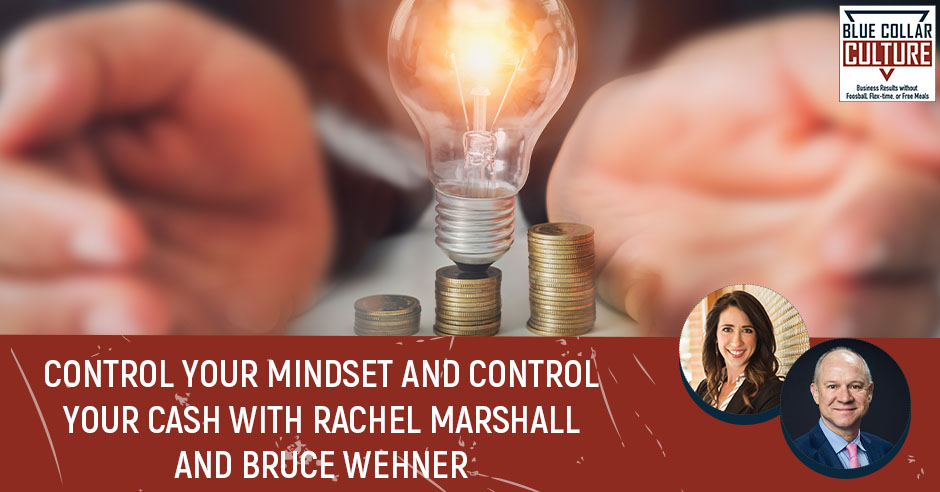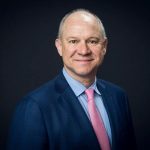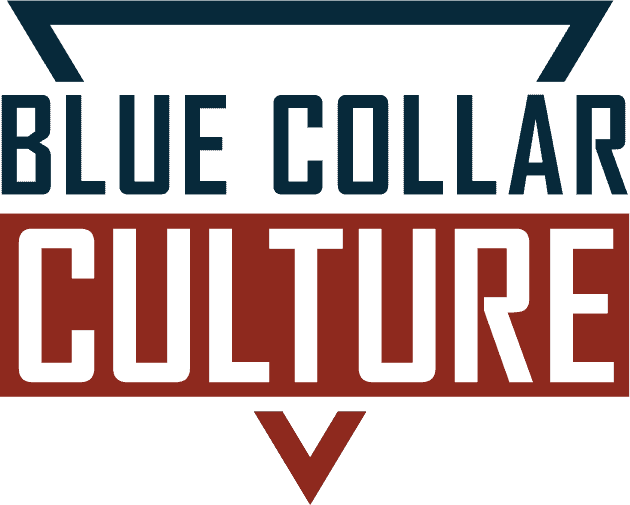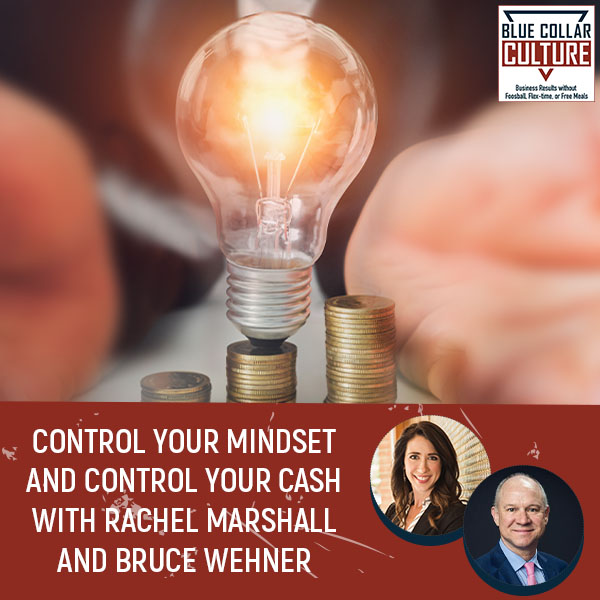
Sustainable business growth takes time and a lot of effort. You have to focus on the key concepts that are critical to your organization. How do you know what strategies you need to formulate and what areas to develop? In this episode, Rachel Marshall and Bruce Wehner, the founders of The Money Advantage, share the importance of solving the right problems through developing the mindset to achieve great things. Most business owners are looking at short-term goals, but you have to look at long-term plans to increase revenue. Tune in to know how to take control and build your wealth!
—
Control Your Mindset And Control Your Cash With Rachel Marshall And Bruce Wehner
I am with the Founders of The Money Advantage. They have great stories on why they do what they do and why they got into this. We forget that our businesses need to be managed for so many business owners, especially financially. There are different philosophies and experts talking about, “Do this. Invest here and that.” our guest and I believe what it comes down to is that there is a mindset around this, whether that is escaping the scarcity mindset and that money is something that’s hard to come by. Whether it’s moving to an abundance mindset and understanding that money is something that can go to work for you for your business and for your family. They have got great stories. I will ask them to share a little bit about why they do what they do, but I want to welcome Rachel Marshall and Bruce Wehner to the show. Thank you for being here.
Thank you for having us.
I am looking forward to this.
Why does each of you do what you do? I know you want to help business owners with generational wealth and those kinds of things.
I came from a situation of poverty and scarcity mindset growing up. Obviously, it’s the oldest one on this show. It took me a long time to overcome that. Now I have a great life and I’m trying to shorten that period of people overcoming that scarcity mindset and realizing that we all understand what we understand from where we live and the information we are getting. We’re making decisions based on the information we have at the time that we are making those decisions, so you should not beat yourself up. Mine is to shorten people’s time of understanding that there’s a bigger world out there.
You start living in abundance. How about you, Rachel?
I went into business because I wanted financial freedom for my own family. I learned so much along the way. I had no idea entrepreneurship was going to be the best personal growth mechanism in the entire world. Where I stand now, I want my kids to be very wealthy. I want them to have access to things that I did not have growing up. I want them to be able to choose how to spend their time, contribute fully and be the most that they can be. In order to do that, I need to be the model, be the example for them, and see what’s possible because of what I create.
What is one of the biggest myths about your industry? I shared a little bit of stuff around mindset, but what do you believe is one of the biggest myths out there surrounding this idea of financial planning or financial advisement for your business?
True wealth is about making sure you are at your best in every area of your life. Click To TweetThere are so many myths around money. The first that comes to mind is that wealth is all about money. We think it’s the dollars, the dollar in the bank account or retirement account. True wealth is about human flourishing and making sure that you are at your best in every area of your life. Money is a small part of that. That would probably be one of the first myths. I know you have one that you talk about all the time as well, about where we invest our capital. Can you talk about that one?
If you are reading and it sounds like you are going to be a business owner, what I see in the financial planning industry is, first of all, you are in your business all the time. You are in the grind and so on and so forth. You could probably use some business consulting and some business coaching to make sure it’s not a grind for you, but unfortunately, especially in my generation, we have been taught that it’s not valuable unless you grind it out and you are working hard. That’s probably the one myth. The other myth is you are going to want to retire one day, so when you meet with a financial planner and that financial planner says, “The best way to get you retired is to put a lot of money into a Tuft’s Preferred Plan.”
I say to that, “Let’s do a little thought experiment here.” If you had $50,000 to put into a Self IRA for your business, what would the rate of return you would like to have on that money? That’s up to you, whatever you want to say. Typically, people say, “I’m hoping in the long run, I would get 7% to 10%.” I say to the person, “What if you took that $50,000, it magically appeared and you put it into your business? What kind of rate of return would you expect in your business?” Inevitably, business owners say, “If somebody gave me $50,000, I know I could turn that around a 20% or 25% rate of return in my business. I try to just be quiet.
Let the little men in their heads say, “That does not make any sense.” What happens is that even further here, they don’t realize they are pulling valuation out of their business, too. If they can grow their business, if you do want to retire down the road, your business valuation will be based on how much you have grown your business. Let that marinate in your head a little bit. The biggest thing that a person in business does is pull money out of their business and put it in place that it’s not accessible and it does not provide an immediate or cashflow in the fairly near future.
You are putting money into prison and you have to ask yourself, “Who is that benefiting? Is that benefiting you or the person with the narrative that they are telling you?” That person may not be a bad person. They are just taught by some corporation how to preach that narrative. They probably don’t even think about it either.
I had told people before, “If I knew how much managing money was required to be a business owner before I got into business owner ownership, I would have gone to work for someone else and let them deal with all the money stuff,” not to just think about planning and making sure we are investing. My financial advisor said, “The best investment you can make with extra cash right now is in your business.” With what we do in helping people hire, especially in the frontline, we also get involved in some of the management positions as well. When we are helping them build out their teams and grow the business, we always find that they don’t want to let go.
They grind it out. That’s what we are taught to do. The problem is if you grind it out until you are 65 and then you want to sell your business because that was your retirement, you are the business. I can’t tell you how many people come to me in their early-60s and are like, “I want to sell in two years. I can’t find people, so my business is stagnant and it’s not getting the valuation I want.” They get the valuation and they find out that without them there, the business is not worth a whole lot, some assets and maybe a customer list.
That idea that we need to grind is rooted in a scarcity mindset. It’s like if I’m not there to do it, it’s not going to get done. There’s so much around mindset when it comes to money. What is one thing that you think holds business owners back? We have this myth, but what is it that they are doing or not doing that’s keeping them from realizing the value they have in their business.

We are big Dan Sullivan followers. We believe that you have to focus on finding the unique ability of everybody to employ unique ability teamwork. You are part of that team. You should not be doing everything in the business. Your job is to work on the business. I don’t think it is ever original, but one of the things that business owners often feel like working on the airplane while it’s flying. They are trying to keep it flying. They don’t realize it would probably be better if they hired a pilot, a couple of flight attendants and maintenance people to work on the ground because you are probably pretty good at every one of those things, but you are not the best.
I came out of the world of education and taught for seventeen years. I use this analogy. As we go up into higher education, which business owners should be trying to do, grow their business from the ground going up. A Math teacher can teach Science because they have had some Science in their life. They could teach English because they have had some English in their life, but I don’t want my son or daughter learning from a Math teacher, teaching Science and English.
You have got to find good people in those particular areas if you want to thrive and send people off like we are trying to grow citizens in our society the best they can possibly be. The same thing in your business, if you are wanting your business to be the best it possibly be, you need specialists in these areas by utilizing unique ability and teamwork.
The number one thing keeping business owners stuck is that they have not transitioned across Robert Kiyosaki’s quadrant from the idea of being self-employed where, “I know what I’m doing. I know this work. I know this field,” until you are a specialist or a technician in the field, but being a specialist or a technician is being self-employed. Truly owning a business is running an operation that relies on people, systems and processes to have a self-perpetuating business that you are in charge of, in control of, but not doing all of the pieces.
One of the biggest challenges we have when I’m talking to business owners, especially when they are smaller, and I ask this question, “Are you still in the truck?” We do a lot of work with the trades. Some of them are like, “Yeah, because I have to. I’m short-staffed. I can’t seem to get myself out of it. I love being in the truck.” They have created a job for themselves.
I found that the gap that they have to bridge from being in the truck to being out of the truck, moving from self-employed to more of that entrepreneurship or business ownership, that bridge is so big and complex sometimes that it’s almost a problem. I am at the point where I don’t know that that can be solved. If that’s what they want, that’s where they are going to be.
One of the things that come up out of this is that they are in this belief that, “My time is equal to money. If I’m not in the truck, I can’t get a paycheck.” The only way money comes out of the business for themselves is as if they are in the truck doing the work. That’s something that you believe also holds people back because they don’t learn how to manage the money and pay themselves well so that they can continue to grow their business.
Many times, business owners get stuck doing $10 an hour tasks. As we spend all of our time putting out fires and doing all the things that are at the lower end of what’s required in our job, we don’t free up our mental space to think about the big problems that need to be solved, the systems differently, what people we need to hire and how they can grow. You have to step away and hire the people who can do those $10 an hour tasks because you need to think of your time as $100, $500, $1,000 or $5,000 per hour as a business owner.
If you use your unique ability to serve others, you're going to create money. Click To TweetIf you think about your time being worth more and you hire out the things that are using up your time, that is not the best use of your time. You will have more free space to think and strategize so that you can grow. That requires paying the person to do the task. It requires paying yourself to do the task as well. Mike Michalowicz is fantastic at this.
I’m sure that you are familiar with Profit First and the idea of having that profit account and paying yourself. That’s a huge piece because if you are in business and trying to make ends meet, serve the next customer and stay open tomorrow. You are not having this long-term view of, “My business is in operation to build the life that I wanted in the first place and to bless and serve other people to contribute to their lives,” you need to think long-term so you can be sustainable.
There’s only been a couple of books that have had a huge impact on me and Profit First was one of them. It was not until I read Profit First for Contractors by Shawn Van Dyke. That hit me. He talks about the Craftsmen Cycle, which is we out and we get the business, then we go do the business and then we go out and get the business. Some people call it the revenue rollercoaster or entrepreneurial rollercoaster. It’s all the same thing. Even if I’m doing $100 an hour work, and I’m the only one doing that work, my business has a lid on it. There’s only so much revenue I’m ever going to be able to make at $100 an hour of work.
I need to find a bunch of people who can do $25 an hour work and go hire 50 of them. All of a sudden, now my business can grow. For a lot of people, that first step is saying, “I’m going to take money out of business and pay me first,” not only is it scary, but often it does not pencil. I’ve learned that. I do the math and I’m like, “There’s not this percentage to take out every month and still pay the bills.”
I have found and talked to enough people to find that does work. Let’s talk about that mindset component because that’s important and I know that you spend a lot of time thinking about this mindset piece. What are some of these beliefs that people hold onto that they need to let go of to move from scarcity to that mindset of abundance and know that this business can do so much more for them?
The idea of scarcity is wired into our DNA. We think everything is a limited resource and that if you win, I’m going to have to lose. If I win, you are going to have to lose. If I make more money, somebody else is going to lose out, and I’m taking money or stealing off the table from them. That is absolutely a false way of thinking. Instead, we need to recognize something huge. That money is created by providing value. If you use your unique ability to serve others, you are going to create money, which is going to improve the world for everyone else. The next piece is that so many people are telling us what to do. Bruce, you talked about noise earlier.
We need to recognize that there are people saying, “Pay off your house and be completely debt-free.” They have an agenda. They want money in their control. You have people saying, “Invest with me. I’m going to get you better returns on your retirement account. You are going to have more retirement dollars.” What’s their agenda? They want control of your capital.
You can hear from the bank, “Put all your money in the bank.” What’s their agenda? They want control of your capital. There is a common theme everybody else wants control of your capital. That is a huge piece that we need to take over in this abundance, thinking that, “I should be in control of my own capital. I’m the best person to do that.”

I have a major and a Master’s degree in Biology. That’s from my educational background. We are wired in a fight-and-flight way for our species to survive. We have to fight this scarcity mindset because that’s how we were developed as an organism, but we have to become hunter-gatherers because we have to try to find these things daily because we don’t know if there’s going to be any more of those. That has persisted in our way of thinking, even though we don’t have to hunt and gather anymore. What you do as a business owner then is you have to say to yourself, “Am I strong enough to get out of this mindset?”
Many people are if that’s the only thing they have to focus on, but they have to focus on everything else, hopefully, their family, health and business. I should not say they don’t have to, but they do have to then make a conservative effort. We tend to then put that on the back burner when we have all these other things flying around. That’s why I would advocate having somebody as you have. You should have a business coach and somebody that’s helping you with your health, whether it’s a doctor, dietician or alternative medicine person. You should have somebody that’s a mindset coach for you. That helps you along the way. It’s an imperative part of your overall health.
The other thing Rachel and I always say is we don’t like this work. This may be surprising because you may have had other people on the show that talked about this. We don’t believe in work-life balance. People say, “What do you mean you don’t believe in work-life balance. You got to have your life under control?” We believe that it’s just life. There is no work and there is no family or life over here. It’s all life. You have to set your life up.
You don’t just say, “I’m working off from 6:00 in the morning until 6:00 at night. I’m shutting it off and I’m going to go with my family.” You should be setting your business up so that if you have to, you can easily go pick your sick daughter up at the school and attend to her or your wife says, “I would like to have lunch with you on Wednesday and talk about a few things,” then you are just, “That’s not even a problem. I’m going to put that in my schedule. It’s no big deal.”
What we have been told is the work-life balance. You got to schedule your work and life. That’s where a lot of these stresses come out with mindset because we have forgotten these little sound soundbites and our life has been to soundbites. None of that is more evident than what we are going through with COVID. It’s all about little soundbites, whether it’s a CDC, our government, the World Health Organization, or people selling a mask. It’s all quick soundbites. You got to overcome these soundbites.
You talk a lot about generational wealth. That’s something that, as business owners, we need to be thinking about since the day we start. Thinking about, “How do we turn this into something that’s going to outlive me?” We have all got a Millennial joke about them being entitled, lazy or whatever that is. We need to understand that the generations view work differently. When the Boomers were being raised by their parents who survived The Great Depression, they were taught, “You need to hoard. You need to protect things. You need to do this. You need to find a company that you can work for 30 years, retire with a pension, take social security and do all those things.”
The Boomers live through some great party times and are like, “We don’t need all of this.” What they did was started teaching their kids, the Gen X-ers and the Millennials, “You do whatever you want. You be whoever you want. You pursue your dreams because the world is a different place now. You don’t have to worry about this protection and scarcity mindset of like, ‘What if the bottom drops out again?’”
We raised an entire generation that basically believes that work is there only to support their lifestyle. We talked about this and saw a lot of means around Millennials saying, “On Monday, if I don’t need money, I’m going to want to take that day off because my life is more important to me.” One of the things we work on is changing this mindset about the way Millennials and the modern workforce think about work. We call it work-life integration.
Business owners need to be honest with the people they hire and those who use their goods and services. Click To TweetThere is no work-life balance. It’s not like we try to figure out how we balance the two. It’s like we integrate. If I need to take a Wednesday afternoon off, my work is such that it’s flexible enough that I can do that or maybe even understanding as employers, sometimes we need to give employees that flexibility as well if we want them to stay committed. We also have to understand that most of the modern workforce thinks of it as, “If I take Wednesday afternoon off, maybe after the kids go to bed on Wednesday night, I will put in a couple of extra hours to catch up.” That’s not balanced. That’s integration. It’s figuring out how my work and my life integrate with each other.
There’s so much around this. The challenge is we can not recognize scarcity as scarcity sometimes. Scarcity on one end of the spectrum says, “I have to save every dollar. I can never spend anything because the bottom might drop out.” Scarcity, on the other side of the spectrum, spins everything because they are afraid of running out of time and not getting to enjoy that money. The problem is the super spender that consumes everything is as much of a scarcity mindset as the person who saves every dollar and hoards it under the bed, mattress, coffee can or freezer.
Both of those are based on fear. Abundance is a faith perspective that truly is a good steward of resources. To be a good steward, you have to first recognize that money is something that is a tool. We are meant to be able to grow and manage it well. This whole generational component is we need to not only be able to pass wealth into future generations, but we need to equip future generations to understand how to manage and use money, not just spend it, but to grow money.
If we think of this stewardship component, that’s a huge calling then for each of us to figure out how to invest well in the next generation. As we are talking about this whole work-life integration, it comes down to starting with saying, “What is my value system? What are my values? What is my mission, vision and purpose in life?” If you get clear on what you want to create, then you can line up your life with that.
If you are going through work to say, “I’m going to work so that I can spend the money,” and you are just spending time with your family so that you can go back to work the next day, that’s a shortsighted view. Instead of you say, “What do I want to create? What home life do I want? What type of family do I want to create?” Then you are in a position to have work that supports that and have a family be integrated in work and think of life more as this life integration.
I’m going to ask you both a question that has been a hot topic in my circles. It’s finance-related, but it’s also people-related. One of the things that a lot of people are talking about is everybody wants to make way too much money for the same job, wages are going up and there’s this scarcity mindset of, “I can’t afford to pay more.” In a lot of the forums that I’m on and the chat rooms, everybody asks me, “How can I get people to come over to my company knowing I’m not paying the market wage even? I’m paying $11 or $15 an hour?”
What are your thoughts or some advice you could give our readers that are struggling with this, “Wages seem to be going up in the industry, but I don’t know how I’m going to make that pencil, how that’s going to work paying higher wages?” What are some things they can think about to push through that?
I want to start from a biological component. There’s something in the Biology-Ecology called the climax community. It talks about how many resources can be in a community. Economics is the same way. It’s like how many resources do you need to produce a product or service? How many resources do you need to bring in capital to consume those products and services? I will give an example because I came from a farming community. We had a lot of prairie areas.

From a biological perspective, there are only so many organisms that can be on an acre of land, but it does not say the same. In other words, if there are 50 rabbits on an acre, it does not stay constant. Five rabbits die and are born every day. It ebbs and flows, and then you put something into that resource area, that acre, that was unintended, like a coyote came in and ate fifteen of them. All of a sudden, the population drops. You might have a situation where you have a lot of rain. A lot of the resources grow, which can sustain a lot more rabbits. The rabbits grow, but then all these rabbits consume a lot more of the resources. Now a lot of rabbits die from starvation and a bit eventually, you reach what they call a climax community. You go up and down, and those peaks and valleys start to smooth out.
The economy is the same way. We are in a situation for a variety of reasons that the worker, labor cost is going up and it’s not going to go up at the same rate that it has been going up. That’s why all of a sudden, the rabbit population goes up. Business owners then have to figure out where that ebb and flow is, that climax community, the ecosystem for their particular business. It may not be that you say, “I’m going to pay $20 an hour instead of $15 an hour.” Your scarcity mindset comes in and says, “I can’t charge more for my product or my service because people will stop using it.”
First of all, you need to be honest with the people you are hiring and the people that are using your goods and services. I have a couple of businesses. One of them is a retail barbecue place. When prices went up, we simply made signs that said, “Due to the increased food costs, we are increasing the prices on these particular items. Sorry for the inconvenience.” The response was very nice. People will say, “We understand.” They would verbally say that.
Some people would say, “I can’t even believe you guys kept the prices low this long.” I’m a big believer that the business owner has to communicate with their people, why something is happening. The same way when you are hiring. You say, “We are offering $18 an hour, but for that, you are going to get X, Y and Z. You are going to get the ability to call in anytime or whatever the parameters are once a quarter and say, ‘I’m taking a mental health day.’ You don’t have to give a reason. You are still going to get paid. It can be at any time five minutes before you have to start work, or you say, ‘I have some issues going on. I’m going to stay at home for now and do my work from home.’”
Obviously, there are certain industries you can’t work from home, but you have to be creative and tell the person, “Yes. You are only getting X amount of dollars, but look at not just the financial benefits, like health insurance, retirement benefits, but the other things that allow you to integrate this work-life integration.” The employees will respond.
Employment benefits are so much more than just compensation. If you can think about the way that you can help your employees feel valued, you understand their needs, they have a place to belong. They feel like they are in a tribe or in a community that sticks together and that is for each other, the affinity that you have from an employee is much more than the paycheck that they are getting.
The other thing I would say is to raise your prices. If you are the business owner and you have additional capital that’s going to be going out to be able to retain the quality of labor that you need to be able to deliver on the promise that you have, I’m sure that none of you are in business to say, “Let’s do the cheapest job possible.” You are saying, “What’s my unique selling proposition. What is the way that I deliver this better than anyone else? I’m faster than the other HVAC company. I’m more upfront and I communicate more fully with transparency to my clients,” whatever that unique selling proposition is, in order to be able to fulfill that, you may need higher quality labor to be able to do that. You may need to raise your prices so that you can hire better employees.
I will give you a quick example of a trade that I used? My dishwasher broke in my house. I got online, “Repair Missouri. Repair specialist for dishwashers.” The first one that popped up was Sears Repair. I didn’t even know they were still available. They have a calendar and I could not get it repaired for two weeks. I click on it anyway because I’m thinking, “What if everybody is like that because of COVID?” I clicked on it. I set an appointment. They tell me it’s going to be a $149 service charge. This is two weeks out. Rachel said, “Raise your prices.”
Employment benefits are so much more than just compensation. Click To TweetI’m like, “Let me see if I can find somebody else.” I found somebody and it was a local person. I called them and they said, “We can be there late today. Would you mind if I’m there tomorrow morning?” I said, “That would be great.” They said, “Our service charge is $89, but we want to make sure you understand. That’s just for us to come. There may be some additional charges.” Their service charge is $89 and they are getting there the next morning. The big corporation was $149 and is not getting there for two weeks. Obviously, they are booked.
The guy shows up. It was simply a wire that had burned through wire nuts. He takes new wiring up, puts it on and says, “It only took me five minutes, but we have a minimum charge of fifteen minutes. I hope you don’t mind. I did not even charge you for the wing nut.” I’m like, “Are you sure that’s okay?” I’m always worried about business owners. I want the owner to be happy with this. He goes, “I am the owner.”
I said, “I can’t help you because I do a lot of business consulting. I want to let you know what your competition is doing. I could not get an appointment for two weeks and they are charging $149. Obviously, people are paying it or they would not be booked up for two weeks. You are charging $89 and you are here the next day.” He goes, “I can’t raise the prices on my loyal customers.” I said, “I think your loyal customers would appreciate it if you would raise the prices so you could stay in business, thrive and feel good.”
He could not grasp that concept. I would share that because I know you have a lot of tradespeople because that is the reality. They need to start thinking differently about that. Your customers want you to be in business. They want you to thrive, not just survive. Grasp those things in life, look at your numbers, and compare them to your competition. Don’t be afraid to charge because you are good.
First, a guy could have said $200. He could have had another guy go out and not the business owner paid that guy $89. He could have got $111 for his profit account. That’s a different way of thinking.
You got to understand what the market is doing for sure. I believe that your customers want you to win. Not that I win and someone else loses, but we all win together, more of that collaboration. One of the things we talk to our clients about is, “Who can you ask for a referral for an employee because it’s hard to find employees right now?” I’m like, “What about your customers?”
I can’t tell you how many times he would be like, “I can’t ask my customers. They can’t know that I need to hire people right now. What are they going to think?” I’m like, “They could think that you are growing and that hiring is difficult. You are asking them for help. They want you to win because they want you to be in business. They want you to be able to continue to take care of them.”
One of my favorite barbecue places down here, we went there and the cost of brisket went up to $7 a pound. I was like, “There’s no notice. There’s no sign. There’s no nothing, but what do I do?” I’m there and it’s my favorite place to get brisket. I pay the money. Many business owners think, “If I raise my prices, I’m going to lose a bunch of customers.” You are only going to lose a bunch of customers if you are a jerk. They want you to be in business. I would be devastated if they went out of business because where am I going to get my brisket now?

There’s so much to that. It’s so much about this abundance mindset. I loved how you started, Rachel, where you are talking about generational wealth and how it’s more than just the money. That only comes from having that abundance mindset. I know that you have a book coming out. I do want you to get to play a little bit because I know people are going to be reading this a lot. Tell us a little about the book that’s coming out. You also have a free offer for our readers.
Let me wrap this all into one for you. The book came out of a near-death experience for me. In May of 2019, I delivered my second daughter and had major complications afterward. I almost did not make it. At the time, I have been in the financial services industry, the financial services space for a long time. We had our estate plan in place, which is something that I highly recommend any business owner and any person to go look at doing an estate plan. We had our estate plan. We had as much life insurance as we could get, both my husband and I, which I highly recommend every single person look at getting as much life insurance as you can. Your human life values. That means as much benefit as you can get.
I had both of those things, but what I realized is that if I had not made it, I had a brand new baby girl and a seven-year-old daughter, what would have been in place beside my husband? None of our lives are guaranteed. What would our daughters have done if they were given this transfer of money financial capital? Even though there’s an estate plan and money in place, what if they receive that and they did not have the guidance to know exactly what to do with it? Spelled out, the values, vision and mission for a life written down so that they would be able to do all the things that we dreamed of doing with them, even if we were not here.
That set my husband, Lucas, and I on this trajectory for several years, figuring out what do we do in our own family to make sure that we are leaving a legacy that’s not just money. How are we passing on the meaning, values, helping our kids become stewards and truly grow so that they can be everything that they are created and called to be? We realized that not only was this helpful for us, but how could we help other people to step into living this legacy, creating generational wealth that’s not just money but it’s also meaning. It’s not just the finances, but it’s also the values. This book that I have coming out is called Seven Generations: Designing A Multi-Generational Legacy Of More Than Money.
It walks through the three pillars, the meaning, mechanism and money. These are the three things that you need in place to make sure that your gift and contribution to the next generation are truly going to accomplish your goals for them. It’s almost a passion project for me and this beautiful way of recognizing that my work was so meaningful to my everyday life.
That is coming out soon. We also have The Insider’s Guide to Earning a Return on the Same Money in Two Places at the Same Time. That is available at PrivatizedBankingSecrets.com. If you go straight there, it’ll be the first thing that pops up and you will be able to grab that guide. This walks you through the basics of understanding how to be the business owner that stores capital, keeps money in your control, and then is able to use that money to improve the rest of your financial life. Something that we do often is called infinite banking. This is a bare-bones, super simple paired-down introduction to what infinite banking is all about and why controlling your capital is so valuable to you.
Thank you so much for being here. I enjoyed the conversation. Sometimes I steer away from financial conversations because it gets a little too technical, but I love your take on the mindset of money and thinking about abundance, how you can put that back to work for you and create a business that you are not only excited about but is working for you. For those who are reading, make sure you go check out and grab that free download. Thank you.
Important Links:
About Rachel Marshall
 Author. Speaker. Consultant. Entrepreneur. Al Levi is a success story like no other. Retiring before age 50, Al Levi began sharing his 7-Power Contractor system, helping other contractors throughout the U.S., Canada and Australia know more success and less stress in their businesses. Contractors can access Al through his book, online one-of-a kind Operating Manuals program, and his long-running column in Plumbing & Mechanical magazine and now in PHC News. For more information, contact [email protected] or visit 7PowerContractor.com.
Author. Speaker. Consultant. Entrepreneur. Al Levi is a success story like no other. Retiring before age 50, Al Levi began sharing his 7-Power Contractor system, helping other contractors throughout the U.S., Canada and Australia know more success and less stress in their businesses. Contractors can access Al through his book, online one-of-a kind Operating Manuals program, and his long-running column in Plumbing & Mechanical magazine and now in PHC News. For more information, contact [email protected] or visit 7PowerContractor.com.
About Bruce Wehner
 I help people keep more of their money. I Discover what money is flowing into your control and what money is flowing out of your control. Then I Strategize to get more money to flow into your control. The End result you will have more money to retain and utilize not only for your life and for future generations.
I help people keep more of their money. I Discover what money is flowing into your control and what money is flowing out of your control. Then I Strategize to get more money to flow into your control. The End result you will have more money to retain and utilize not only for your life and for future generations.
Love the show? Subscribe, rate, review, and share! https://bluecollarculture.com/podcast/

